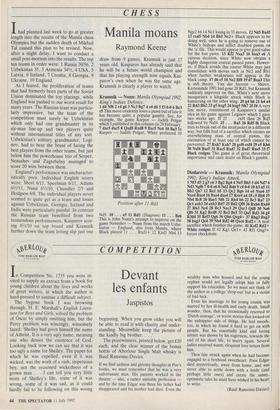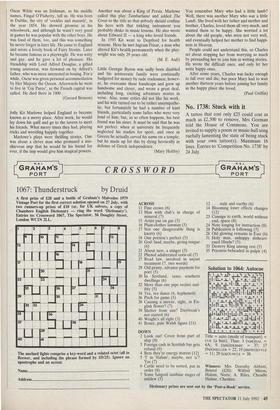Devant les enfants
Jaspistos
In Competition No. 1735 you were in- vited to supply an extract from a book for young children about the lives and works of great writers, in which the author is hard-pressed to sanitise a difficult subject.
The bygone book I was browsing through, H. E. Marshall's English Litera- ture for Boys and Girls, solved the problem of Oscar by simply omitting him, but the Percy problem was wincingly, winsomely faced: 'Shelley had given himself the name of Atheist. It is a very ugly name, meaning one who denies the existence of God. Looking back now we can see that it was too ugly a name for Shelley. The paper for which he was expelled, even if it was wicked, was the work of a rash, impetuous boy, not the reasoned wickedness of a grown man . . . I can tell you very little more of Shelley's life, some of it was wrong, some of it was sad, as it could hardly fail to be following on this wrong beginning. When you grow older you will be able to read it with charity and under- standing. Meanwhile keep the picture of the kindly big brother. . .
The prizewinners, printed below, get £20 each, and the clear winner of the bonus bottle of Aberlour Single Malt whisky is Basil Ransome-Davies.
If we find sadness and gloomy thoughts in Poe's books, we must remember that he was a very unfortunate man. His parents worked in the theatre — alas, a rather unstable profession — and by the time Edgar was three his father had disappeared and his mother had died. Even the wealthy man who housed and fed the young orphan would not legally adopt him or fully support his education. So we must not think of the author as a college 'drop-out' but as a victim of bad luck.
Even his marriage to his young cousin was marred by her ill-health and early death. Small wonder, then, that he occasionally resorted to 'Dutch courage', or wrote stories that looked on the unhappier side of things. He had moods, too, in which he found it hard to get on with people. But his essentially kind and loving nature was shown by his eagerness, towards the end of his short life, to marry again. Several ladies received warm, eloquent love letters from him.
Then fate struck again when he had become engaged to a boyhood sweetheart. Poor Edgar died mysteriously, away from home, and was never able to settle down with a bride (and perhaps little ones) and create the sunny, optimistic tales he must have wished in his heart to write.
(Basil Ransome-Davies) Oscar Wilde was an Irishman, as his middle names, Fingal O'Flaherty, tell us. He was born in Dublin, the city of `cockles and mussels', in the year 1854. He showed promise in his schoolwork, and although he wasn't very good at games he was popular with the other boys. He was fond of them, too, and this was something he never forgot in later life. He came to England and wrote a lovely book of Fairy Stories. Later he became famous as a playwright. He was witty and gay, and he gave a lot of pleasure. His friendship with Lord Alfred Douglas, a gifted young aristocrat, was frowned on by Alfred's father, who was more interested in boxing. For a while, Oscar was given personal accommodation by Her Majesty the Queen. Afterwards he went to live in `GM Paree', as the French capital was called. He died there in 1900.
(Gerard Benson) Jolly Kit Marlowe helped England to become known as a merry place. After work, he would lay down his quill and go to the tavern to meet his friends. What merry times they had, playing tricks and wrestling happily together.
Marlowe's plays were thrilling stories. One was about a clever man who promised a mis- chievous imp that he would be his friend for ever, if the imp would give him magical powers. Another was about a King of Persia. Marlowe called this play Tamburlaine and added The Great to the title so that nobody should confuse his hero with that tinkling instrument you probably shake in music lessons. He also wrote about Edward II — a king who loved friends.
In 1593 Kit went to Deptford for health reasons. Here he met Ingram Frisar, a man who altered Kit's health permanently when the play- wright was only 29 years old.
(M. E. Ault) Little Georgie Byron was sadly born disabled and his aristocratic family were continually badgered for money by rude tradesmen; howev- er, he overcame these handicaps and grew up handsome and clever, and wrote a great deal, including long, exciting adventure stories in verse. Alas, some critics did not like his work, and his wife turned out to be rather unsympathe- tic, but fortunately he had a number of kind friends, particularly some ladies who were very fond of him; but, as so often happens, his best friend was his sister. It must be said that he was not perfect: when at university he frequently neglected his studies for sport, and once in Greece he actually carved his name on a temple; but he made up for this by dying heroically in defence of Greek independence.
(Mary Holtby) You remember Mary who had a little lamb? Well, there was another Mary who was a little Lamb. She lived with her father and mother and brother, Charles, loved them all very much, and wanted them to be happy. She worried a lot about the old people, who were not very well, and eventually helped her mother to find happi- ness in Heaven.
People could not understand this, so Charles set about stopping her from worrying so much by persuading her to join him in writing stories. He wrote the difficult ones, and only let her write happy ones.
After some years, Charles was lucky enough to fall over and die; but poor Mary had to wait another thirteen years before joining her family in the happy place she loved.
(Paul Griffin)
No. 1738: Stuck with it
A tattoo that cost only £25 could cost as much as £2,500 to remove, Mrs Gorman told the House of Commons. You are invited to supply a poem or music-hall song ruefully lamenting the state of being stuck with your own tattoo(s). Maximum 16 lines. Entries to 'Competition No. 1738' by 24 July.



















































 Previous page
Previous page